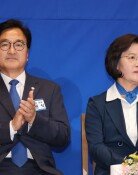Stop conflict over condolences
North Korea, which had initially said it would reject condolence delegations from other countries after the death of its leader Kim Jong Il, announced Friday that it will accept all condolence delegates from South Korea. Pyongyang also denounced Seoul for its "barbarian act" of barring civilians from visiting the North to pay condolences.
North Korea urged the South Korean government to "show due courtesy," warning that failure to do so could "completely" ruin bilateral relations. How can a funeral host post a threat? New North Korean leader Kim Jong Un, who is still waiting for his father`s funeral, is following the same old path of his father.
As if having waited for the North`s signal, certain pro-North Korea groups are clamoring to form condolence delegations and pay homage to Kim Jong Il at the Kumsusan Memorial Palace in Pyongyang. The headquarters of the Pan-National Alliance for Reunification, which has been declared an enemy-benefitting organization by the South Korean Supreme Court, has proposed that all Korean people pay their respects to Kim Jong Il. The organization hurriedly tried to protect North Korea when it sank the South Korean naval vessel Cheonan and killed 46 crewmen. Seoul has exceptionally allowed the widows of the late South Korean President Kim Dae-jung and Hyundai Group Chairman Chung Mong-hun to visit Pyongyang to pay condolences to return the North`s favor of paying respects to Kim Dae-jung and Chung when they died. While Seoul can allow other South Koreans to visit Pyongyang for the funeral to promote inter-Korean exchanges and reconciliation, it should never allow pro-North groups to do so.
It is inappropriate for Seoul to say that since Kim Jong Il, who was responsible for the attack on the Cheonan and the frontline island of Yeonpyeong last year, is dead, it can no longer hold his successor responsible. At a time when more truth must be discovered about the two incidents, such an attitude could invoke misunderstanding that Seoul is moving to pardon Pyongyang for its acts to resume stalled inter-Korean dialogue. When the North shelled Yeonpyeong, Kim Jong Un held the title of general. Whenever Seoul held out an olive branch, Pyongyang struck it on the back of its head. A rash reconciliatory gesture could invite disaster.
Without a clue suggesting a change in the North Korean regime, it is premature to consider resetting inter-Korean relations. If Pyongyang overcomes internal chaos and shows its determination to abandon its nuclear weapons program and improve relations with Seoul, the South will have many opportunities to provide bold assistance to the North. The Lee Myung-bak administration in Seoul should draw a blueprint for restoring community of the Korean nation.







